Over 30 years of anarchist writing from Ireland listed under hundreds of topics
International
The occupiers of Tahrir Square are with you - violence, defense & police repression

This statement from 'Comrades from Cairo' expresses solidarity and a sense of common struggle with the Occupy movement that has sprung up across the globe. It explains that the movement in Cairo was not non-violent but rather when police tried to evict Tahir square "Barricades were erected, officers were beaten back and pelted with rocks even as they fired tear gas and live ammunition on us. But at the end of the day on 28 January they retreated, and we had won our cities."
Irish Anarchist Review 4
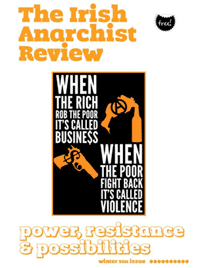 Welcome to issue 4 of the Irish Anarchist Review, produced by the Workers Solidarity Movement. This magazine aims to provide a forum for the exploration of theories, thoughts and ideas about political struggle, and where we would like to go and how to get there from the current situation. This magazine also seeks to be a place where people interested in revolutionary politics can read first-hand reports from people involved at the ‘coal-face’ of working-class struggles and perhaps reply to it with an article of their own. We believe there can be no revolution worthy of the name without a genuine sharing of political ideas between people.
Welcome to issue 4 of the Irish Anarchist Review, produced by the Workers Solidarity Movement. This magazine aims to provide a forum for the exploration of theories, thoughts and ideas about political struggle, and where we would like to go and how to get there from the current situation. This magazine also seeks to be a place where people interested in revolutionary politics can read first-hand reports from people involved at the ‘coal-face’ of working-class struggles and perhaps reply to it with an article of their own. We believe there can be no revolution worthy of the name without a genuine sharing of political ideas between people.
An introduction to Michel Foucault's concept of Power
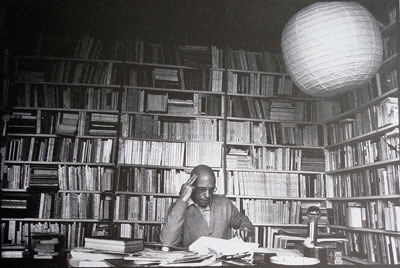 Michel Foucault is a philosopher whose politics everybody seems to have a differing opinion on. He has been called a disguised Marxist, both a secret and explicit anti-Marxist, a nihilist, a new conservative, a new liberal, a neutral interpretivist, a crypto-normativist, a principled anarchist as well as a dangerous left-wing one, and even a Gaullist technocrat. An American professor complained that an obvious KGB agent like Foucault was being invited to talk at his country’s universities and the Eastern European press of the Soviet era denounced him as being an accomplice of the dissidents.
Michel Foucault is a philosopher whose politics everybody seems to have a differing opinion on. He has been called a disguised Marxist, both a secret and explicit anti-Marxist, a nihilist, a new conservative, a new liberal, a neutral interpretivist, a crypto-normativist, a principled anarchist as well as a dangerous left-wing one, and even a Gaullist technocrat. An American professor complained that an obvious KGB agent like Foucault was being invited to talk at his country’s universities and the Eastern European press of the Soviet era denounced him as being an accomplice of the dissidents.
As Gaddafi falls - Lessons from Libya - imperialism, anti-imperialism & democratic revolution
With Al Jazerra reporting that Gaddafi has been killed during or after the closing phase of the battle of Sitre Andrew look's back at the rebellion in Libya and the decade of co-operation with imperialism that preceeded it.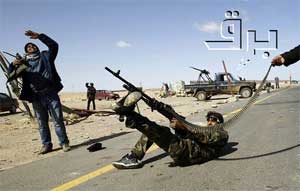
The sudden end of the Gaddafi regime some 6 months after the start of the Libyan revolt leaves some difficult questions unanswered for the left. Gaddafi’s determination to physically crush the revolt quickly transformed it into a civil war, a civil war that saw considerable imperialist intervention on the rebel side, intervention that was essential to their eventual victory. This and Gaddafi’s historic record led to some on the left taking his side in the civil war while other organisations tried to balance support for the ‘Arab spring’s’ arrival in Libya with opposition to imperialism. This question of where the balance lies between international solidarity with pro-democracy movements and opposition to imperialism could well rapidly return to the top of the agenda in a very much bigger way as the regime in Syria continues its months long military suppression of the democracy movement there.
(Image from B.R.Q. via Flickr under Creative Commons )
The basics of Participatory Economics
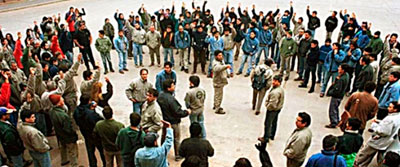 In the last issue we had a missive from the future. It told us of the great changes in the post-revolutionary anarchist world. In this article of the future society series, I will focus solely upon an anarchist vision of a future economy. This is called participatory economics, often abbreviated parecon, a classless economic system proposed primarily by activist and political theorist Michael Albert and, among others, economist Robin Hahnel. The model was developed through the 70s and 80s and the first exclusively parecon books were published in 1991. Many of their early writings concentrated on what they perceived as flaws in Marxist and Marxist-Leninist theory.
In the last issue we had a missive from the future. It told us of the great changes in the post-revolutionary anarchist world. In this article of the future society series, I will focus solely upon an anarchist vision of a future economy. This is called participatory economics, often abbreviated parecon, a classless economic system proposed primarily by activist and political theorist Michael Albert and, among others, economist Robin Hahnel. The model was developed through the 70s and 80s and the first exclusively parecon books were published in 1991. Many of their early writings concentrated on what they perceived as flaws in Marxist and Marxist-Leninist theory.
Revolution & Counter Revolution in Barcelona
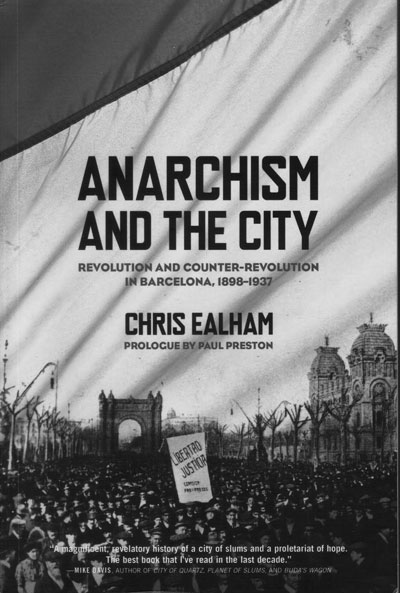 Seventy-five years ago, in Barcelona and across much of the rest of Spain, anarchists and other radical workers, in order to stop Franco’s attempted coup, stormed army barracks, took over the factories and kicked off “the greatest revolutionary festival in the history of contemporary Europe.”(p.173). A familiar story no doubt, however, unlike many ostensible working class histories of the period, that are often just histories of workers’ organisations, Ealham’s engaging writing and theoretical fluency give us a complete view of proletarian life, from community centres in the city’s slums, to unemployed groups of shoplifters, to general strikes and uprisings.
Seventy-five years ago, in Barcelona and across much of the rest of Spain, anarchists and other radical workers, in order to stop Franco’s attempted coup, stormed army barracks, took over the factories and kicked off “the greatest revolutionary festival in the history of contemporary Europe.”(p.173). A familiar story no doubt, however, unlike many ostensible working class histories of the period, that are often just histories of workers’ organisations, Ealham’s engaging writing and theoretical fluency give us a complete view of proletarian life, from community centres in the city’s slums, to unemployed groups of shoplifters, to general strikes and uprisings.
Greece & the crisis - Seeds of Hope
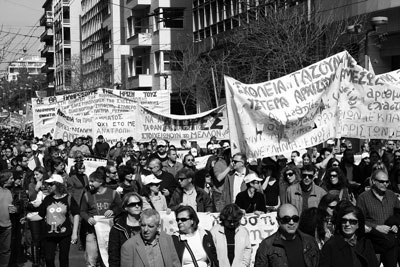 There is no doubt that the political history of Greece is full of oppression and political struggle - from dictatorships to political prosecutions, jailings, exiles, shootings, torture, civil war, and countless strikes, demonstrations, occupations and protests that are put down by extreme state violence.
There is no doubt that the political history of Greece is full of oppression and political struggle - from dictatorships to political prosecutions, jailings, exiles, shootings, torture, civil war, and countless strikes, demonstrations, occupations and protests that are put down by extreme state violence.
Review: Zapatista Spring
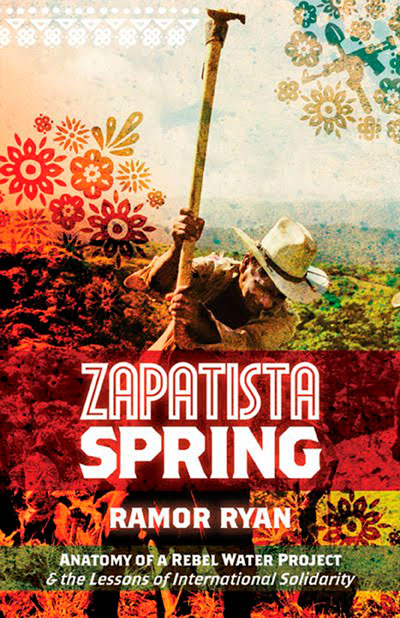 Editors’ Note: In this issue of the IAR we have the all too rare pleasure of reviewing a book by a fellow Irish anarchist. It’s Ramor Ryan’s Zapatista Spring, one of the most honest books yet published about the Zapatistas.
Editors’ Note: In this issue of the IAR we have the all too rare pleasure of reviewing a book by a fellow Irish anarchist. It’s Ramor Ryan’s Zapatista Spring, one of the most honest books yet published about the Zapatistas.
Noam Chomsky, Naomi Klein, Michael Moore, Michael Albert on the Occupy 'x' movement
 A large number of left writers & film makers have come out in support of the Occupy X movement, often speaking at the various occupations. Here are video's of Noam Chomsky, Naomi Klein, Michael Moore & Michael Albert talking about the movement.
A large number of left writers & film makers have come out in support of the Occupy X movement, often speaking at the various occupations. Here are video's of Noam Chomsky, Naomi Klein, Michael Moore & Michael Albert talking about the movement.
Miami: spread the occupation amid the whirlwind of crisis
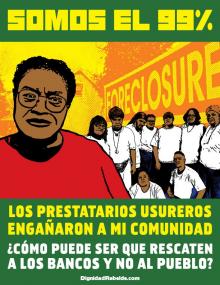 A movement is born. Across America and around the world occupations have spread. We witness the beauty and struggle of a new protagonist joining the fight against oppression and exploitation. Crisis feeds conflict: the pillaging of communities galvanizes people from Greece and Chile, Bangladesh and China, the United States and Spain. A massive wave has been unleashed of impoverishment, unemployment, austerity, and stealing of resources by capital, governments, and the wealthy. We face loss of our jobs, homes, and way of living, with no avenue for contesting these problems within the institutions of power. Doors are being closed. Futures are being stolen.
A movement is born. Across America and around the world occupations have spread. We witness the beauty and struggle of a new protagonist joining the fight against oppression and exploitation. Crisis feeds conflict: the pillaging of communities galvanizes people from Greece and Chile, Bangladesh and China, the United States and Spain. A massive wave has been unleashed of impoverishment, unemployment, austerity, and stealing of resources by capital, governments, and the wealthy. We face loss of our jobs, homes, and way of living, with no avenue for contesting these problems within the institutions of power. Doors are being closed. Futures are being stolen.

